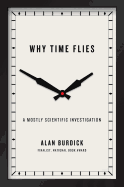
According to Alan Burdick in Why Time Flies: A Mostly Scientific Investigation, "time" is the most commonly used noun in American English. A staff writer for the New Yorker and National Book Award finalist for Out of Eden, Burdick recognizes that his subject is complicated. He notes, "If you ask a scientist who studies time to explain what time is, he or she invariably will turn the question on you: 'What do you mean by time?' "
There are many answers, which Burdick tackles with wit and wonder, mapping a nuanced exploration through mathematics, sciences, philosophy and observations of his own young sons. Burdick's investigation leads him across the world, to neuroscientists' labs, a free-fall attraction in Texas and even an encampment north of the Arctic Circle, where the sun shines night and day during summer. The book teems with entertaining trivia and stories, such as the fact that even cabbages have circadian clocks, and the origins of Greenwich Mean Time and the frustrated astronomer charged with keeping it--whom the townspeople incessantly interrupted to find out the time. Some of the science is mind-boggling. It turns out, Burdick relays, that "right now" has always already happened, several milliseconds ago--and that the perception of "right now" can be manipulated in labs.
Burdick's compelling research consistently conveys curiosity and awe for the notion of time and its passage. Why Time Flies is not a quick read; it demands contemplation. But, naturally, it's time well spent. --Katie Weed, freelance writer and reviewer

